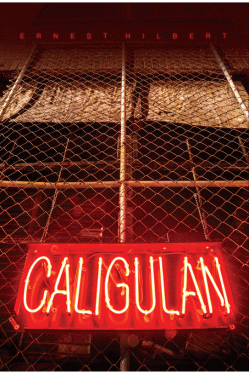Tough-minded and precise, Ernest Hilbert’s lyrics, like his old mirror left out at the curb, turn an unflinching gaze on pieces of inner and outer landscapes we often push to the periphery. The poems in Caligulan fashion a stern, witty, and often poignant music out of seemingly unpromising elements courageously glimpsed, combined, or imagined.
—Rachel Hadas, author of Halfway Down the Hall: New and Selected Poems and editor of The Greek Poets: Homer to the Present
The work of art that moves through Summer to Spring is the work of an optimist. So don’t let the title fool you. As the star under which the poems in this collection move, the title Caligulan is brutal and yet beautiful, highly refined and yet enticingly diurnal. Moved by beauty, attuned to the sublimity of natural things, livened by paradox, coaxed into song by pentameter, Ernest Hilbert’s rich new book covers more emotional ground than a reader has any right to expect of a poet writing in this muted and mumbling world we have made for ourselves. "Caligulan" poems like “Squirrel Hill” are hard to come by. And when you come to them you feel grateful for such a luscious reminder of how poetry can honor the life lived, the live taken from us, and the life still to be lived. Indeed, Caligulan is a timely reminder that the only tyrant that can take poetry away from us is us.
—Rowan Ricardo Phillips
There’s much pleasure, clarity, and discipline to the way Ernest Hilbert looks around him in Caligulan, at the complicated textures of city and landscape, and at all the stuff, the materials, the detritus, that make up a place, a time, and a life. In these easily formal, easily idiomatic poems you’ll read about a dishwasher—his “arsenal of cutlery, / The spider-eggy fluff / That clings like mold to crockery”—and you’ll also meet the stuffed moose at a science museum: “You still startle, filling half the false sky . . . . // You tower / In the same black forests I’ve traveled lately.” Hilbert gets the details right, and he also gets the emotions right. “The smoke alarm fails, and your computer crashes” while an ATM is “pitiless, displays a message for / Insufficient Funds.” But there’s also this: “You want to fight. / You spit and shout. In daydreams you sing.” This is a book full of the real, and also full of heart.
—Daisy Fried, author of Women’s Poetry: Poems and Advice
Caligulan delivers on all of its title's promise. Every poem evokes the world we live in: we know something is wrong and, in a minute, will likely be worse; but there's beauty in the portent and in the self-awareness we need to see it. Hilbert's remarkable ability to draw a scene so clear you immediately make yourself at home, and so suggestive you want to get out because you know you can't settle in, makes this collection a page-turner in a way most poetry books can never be.
—Erica Dawson

Order from:
Ernest Hilbert’s debut collection Sixty Sonnets (2009) was described by X.J. Kennedy as “maybe the most arresting sequence we have had since John Berryman checked out of America.” His second collection, All of You on the Good Earth (2013), has been hailed as a “wonder of a book,” “original and essential,” an example of “sheer mastery of poetic form,” containing “some of the most elegant poems in American literature since the loss of Anthony Hecht.” Hibert works at Bauman Rare Books in Philadelphia, where he lives with his wife, Lynn Makowsky, Keeper of the Mediterranean Section at the University of Pennsylvania Museum of Archaeology and Anthropology.